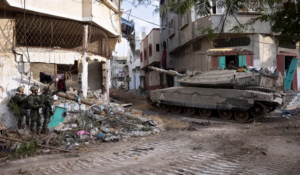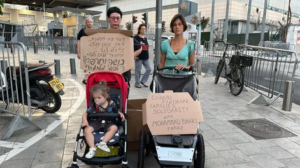Israeli army left Palestinian with Down Syndrome to die after dog attack in Gaza home

Israeli soldiers in Shujaiyeh, Gaza, December 2023
Nagham Zbeedat and Sheren Falah Saab report in Haaretz on 22 July 2024:
Mohammed Bhar, a resident of the Shujaiyeh neighborhood in eastern Gaza City, was attacked by an Israel Defense Forces combat dog in his home in the beginning of July, and according to his family was left to die by Israeli soldiers.
A spokesperson for the IDF, replying to Haaretz’s questions on the incident, confirmed it occurred, saying it was during a “significant exchanges of fire between IDF troops and Hamas terrorists,” and adding that “the troops that gave initial medical treatment to the individual who was bitten in the apartment had to leave to ensure treatment was given to injured soldiers.”
Bhar, 24, was an autistic man who also had Down syndrome. His family told the BBC and other news outlets last week that their home was stormed by soldiers on July 3, after a week of heavy fighting in the area, and that the soldiers aimed their rifles and weapons at them. Amid the chaos, Bhar thought the dog was playing with him. He patted the animal’s head and said, “Leave me alone, habibi,” even as the dog tore at his hand and continued to attack him.
Nabila Ahmed Bhar, Mohammed’s mother, told the BBC and Andalou News Agency that as her son’s arm was bleeding heavily, some of the soldiers took him to another room, seemingly to assess his wounds and treat him. The family was forcibly evicted from the home a few hours later, with Mohammed still in the next room. When they were finally able to return to their home a week later, they found him in the room, dead, with wounds that had barely been treated.
Members of the Bhar family have told the media they were trapped in their home during the IDF’s operation in Shujaiyeh. In her conversation with the BBC, Nabila Bhar said her son had difficulty moving, and “didn’t know how to do anything by himself.” His mother and brothers, as well as nephews and nieces, took care of him.
Human rights organizations have reported since the beginning of the Gaza war that people with disabilities and their families find it harder to get to, and stay in, the IDF designated “safe zones,” and they sometimes opt to stay at home under immense risk. In general, their ability to flee is extremely limited. According to a Human Rights Watch report from November, people with disabilities interviewed by the organization said they “lost assistive devices when Israeli strikes destroyed or damaged their homes, leaving them homeless and unable to get necessities.”
Already before the current war, about 21 percent of Gazan households had at least one member with a disability.
‘Suddenly, Mohammed fell silent’
Recounting the attack, Mohammed’s mother said her son was terrified, and that she “pleaded with the army to call off the dog, telling them Mohammed was ill.” She then told the soldiers she wanted to treat her son and had a first aid bag that could help. However, one of the soldiers told her that a military doctor with them would assist him.
“I could hear Mohammed moaning in pain. Occasionally, they would open the door, glance at him, and command ‘Oskot’ [Arabic for stay silent], then shut it again,” Bhar recounted to the Middle East Eye website. “Then the soldiers exchanged gestures. A doctor who accompanied them entered the room, and suddenly Mohammed fell silent.”

Parents of children with Downs syndrome protest outside the national defense headquarters in Tel Aviv, 24 July 2024
Nabila Bhar said she suspected the doctor administered a sedative, as she could no longer see or hear Mohammed after that. “I asked the soldier, ‘Where is Mohammed?’ He replied, ‘Mohammed is gone.’ I pressed, ‘Gone where?’ He insisted, ‘He’s gone. There is no Mohammed.'” After that, the family was ordered, at gunpoint, to leave Mohammed behind and leave the neighborhood with other residents. Mohammed’s sister, Sarah Bhar, has told journalists that two of her other brothers were arrested at the house by the soldiers. She believes Mohammed was left bleeding, and possibly died of thirst.
Sarah said her cousins were the first who managed to return to the family home – and they found Mohammed’s body. Mohammed’s brother Jibreel saw the body when he was allowed back after a week. “We thought he wasn’t at home,” he told the BBC. “But it turned out he had been bleeding and left alone at home all this time.”
‘The individual likely remained alone’
Last week, the IDF spokesperson told different outlets it was “looking into the report.” Over the weekend, the IDF replied to Haaretz’s query on the matter, confirming that the incident took place and added: “The IDF regrets any harm to civilians during combat operations.” The IDF’s response also mentioned that “several canines have even sacrificed their lives during combat” in Gaza.
The IDF said soldiers went into the Bhar’s home during an operation in Shujaiyeh that included “significant exchanges of fire between IDF troops and Hamas terrorists.”
It went on to say: “As part of the operation against the terrorists, the troops searched buildings using a canine. Inside one of the buildings, the canine detected terrorists and bit an individual. The troops provided initial medical treatment to that individual in a separate room within the building and urged his family to evacuate the apartment to avoid staying in the combat area.
“Exchanges of fire continued throughout the operation, during which an RPG was fired at our troops, hitting an IDF tank and causing injuries to soldiers, ultimately resulting in the death of one of them. Following the RPG strike, the troops that gave initial medical treatment to the individual who was bitten in the apartment had to leave to ensure treatment was given to the injured soldiers. At this point, the individual likely remained alone in the building. It should be emphasized that this incident underscores Hamas’ practice of operating within civilian environments and using the civilian population as human shields.”
‘We need to know it won’t happen again’
While Mohammed Bhar’s death caused outrage on social media in the Arab world, it was hardly mentioned in the Israeli media. Still, Israeli families of people with Down syndrome protested the incident last Wednesday, on the sidelines of a demonstration in front of the IDF headquarters in Tel Aviv calling for a hostage deal.
Olga Jitlina, the mother of a 5-year-old with Down syndrome, told Haaretz: “We’re showing solidarity as special needs families, because that’s basically our identities – for me it’s a bigger part of my identity than being Jewish or Palestinian. It’s something that brings us together. So we want to demand that the Israeli government and the IDF open an investigation to understand what happened.”
Seeking better care for her child, Jitlina made aliyah to Israel from Russia – only to find herself protesting for other people who raised children with Down syndrome. “It’s totally unacceptable for us as special needs parents, it’s our nightmare,” she said. “We need to know that it won’t happen again, and that the people who would do this to special needs children wouldn’t do this to our kids.”
Linda Dayan contributed reporting.
This article is reproduced in its entirety
